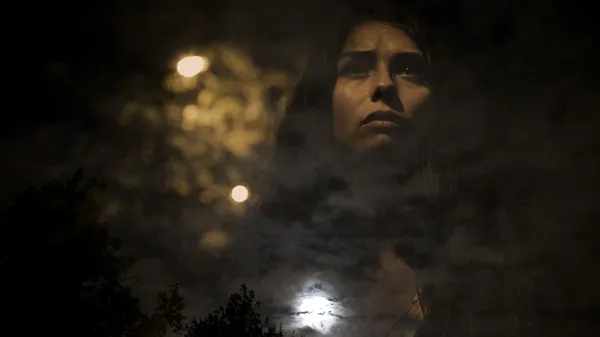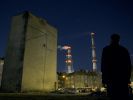Eye For Film >> Movies >> The Light Of Night (2022) Film Review
The Light Of Night
Reviewed by: Jovana Gjorgjiovska

“If we want to know the meaning of existence, we must open a book: over there, in the darkest chapter, there’s a sentence written especially for us.” - Pietro Citati
It’s a cold night in a nameless city, stripped of cultural references and era-defining characteristics. Only the full Moon illuminates the dim alleys in which eerie shadows rise to meet the (anti)heroes of “few parables and a morality”, as the epigraph of The Light of Night defines the lyrical feature debut of Tomek Tryzna. In it, the Polish director goes where few dare to tread, both figuratively and metaphorically.

Instead of a clearly defined narrative with a handful of main characters, Tryzna ponders intricate philosophical questions through several loosely connected stories of unnamed protagonists — almost always in pairs — continuously traversing dark streets, usually too dangerous to move around alone. However, this is not a case of an observant camera merely following people on a night stroll through the urban equivalent of Charles Baudelaire’s beauty — simple, unintended, and unconsciously strange.
The city is a character on its own, its quiet wheezing a constant soundscape. Giant air-polluting factories, monotonous building blocks and lush public parks confine the pairs of characters within their conversations, ranging from inconsequential anecdotes to ideas bigger than life. Although the nature of the pairs’ relationships differs — friends, strangers and lovers — the abrupt changes in their behavior towards each other grow predictable. As soon as one of the characters starts sharing intimate thoughts, the thread connecting the pair strongly rebounds and they swap positions, beginning to act opposite to what they were doing until the breaking point.
While most of the duos seem to be trapped in a misleading contrast of victims and perpetrators, they are nonetheless dependent on each other. When one of them inevitably freezes mid- sentence, they require someone to wind them up and kick their leg to restart — much like the practice of percussive maintenance — as if they are old music boxes and CRT television sets. While this high-concept metaphor brings a peculiar flavour to the self-contained parables, it is used only as an instrument to weave them together, leaving more angles to be explored. In a rare clue about the wider social setup, a public broadcast informs the citizens that society is “not as they are telling us”. Following this and a hastily made distinction between people alive and those wound up, a subtle dystopian atmosphere looms in the mysterious narrative background.
Similar to the sudden changes in the dynamics of the character pairs, the cinematographer Piotr Bartos and editor Adrian Janisio combine a plethora of shooting approaches and editing techniques to capture the essence of each parable. The result is a unique stream of black-and- white images resisting clear labels, both vagarious and fragile at the same time.
Inspired by Pietro Citati’s musings on humanity’s great myths, Tryzna encapsulates the darkest hour of the night in a cinematic kaleidoscope of potential answers to the timeless question: what is the meaning of existence? As we saunter along the characters in The Light of Night, expectations fully suspended, our sole guidance is the Moon’s lustre.
Reviewed on: 23 Nov 2022
















